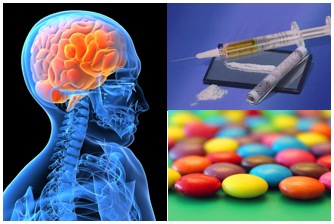Fooducate Blog - Food and the Brain: Is Sugar Addictive? |
| Food and the Brain: Is Sugar Addictive? Posted: 15 Mar 2012 05:10 AM PDT This is a guest blog post by Jennifer Lee, Ph.D. We've all heard of "sugar-highs" and informal theories that foods, especially sweets, can act like drugs in our system. But how much truth lies in such rumors? If food can be addictive, how so, and why? And what are we supposed to do about it to make sure our kids and ourselves stay "clean"? Considering human evolution, it is in our best survival interest that we have an inherent desire for foods high in calories (that's why they taste so good). Indeed, research shows that, like humans, other mammals enjoy tasty treats (even without the influence of the modern food industry and its propaganda). Unfortunately, for those of us in environments conducive to food addiction, this natural desire can go awry. Many people say they crave sweet foods the same way alcoholics crave liquor, or a junkie craves his next "fix". Believe it or not, this claim has some justification in science. Laboratory rats given intermittent access to a sugary drink exhibit typical addictive behaviors almost immediately: bingeing when sugar is available, crashing when it's not (withdrawal, anxiety, depression, and craving-like behaviors). So, very sugary substances, at least behaviorally, act much like addictive narcotics. But what about physiologically? Most addictive drugs cause increases in extracellular dopamine in a part of the brain called the nucleus accumbens. Dopamine is one of our "feel-good" neurotransmitters that is largely responsible for our motivation and reward systems. Typically, drug-seeking behavior will cause a rise in dopamine levels in the brain even before the drug is actually consumed––the mere anticipation of reward is oh-so rewarding. Rats addicted to sugar ingest it in a binge-like manner that releases dopamine in the accumbens during and right before consumption, much like heroin use in humans. And also like drug addiction, this sugar bingeing causes changes in the expression and availability of dopamine receptors in the brain: the next "high" will require even more sugar to achieve the same effect. Another interesting tidbit: High sugar consumption mimics our brain's natural opiate system. Opiates are the pleasure chemicals found in our brains (released after orgasm and vigorous exercise, among other things) and in drugs derived from the poppy plant (morphine, heroin, oxycodone, etc.). Of course, no one is saying that eating a bag of Twizzlers is on-par with recreational Vicodin use. The problem with these pleasure chemicals comes in their addictive consequences. Sugar addiction causes opioid-like changes in gene expression (in the accumbens), opioid withdrawal (which can be induced with naloxone, a drug used to treat heroin overdose), and a decrease in extracellular dopamine in periods without sugar availability. As with any addiction, you can see how the vicious cycle works: decreased dopamine causes craving and withdrawal, which is such a "low" that you just need this one last box of Girl Scout Cookies and then you're back on-track tomorrow. But tomorrow comes, and it is even harder to stay off the sweets than yesterday. So now you know that there is some evidence to suggest that sugar can be addictive. As with any consumable that is very desirable, moderation is the key. Trace amounts of refined sugars every now and then are fine… binges are dangerous. Fruits are a good source of sugar as they contain other nutrients that will fill you up and make you less likely to consume too much sweetness. When you're craving a sweet, ask yourself what sweets you have had lately, and how much of them you allowed yourself. Might you be battling a sugar addiction? Information in part from "Evidence for sugar addiction: Behavioral and neurochemical effects of intermittent, excessive sugar intake," Neuroscience and Behavioral Reviews 32 (2008) 20-39.
Get Fooducated: Follow us on twitter: twitter.com/fooducate on facebook: facebook.com/fooducate |
| You are subscribed to email updates from Fooducate To stop receiving these emails, you may unsubscribe now. | Email delivery powered by Google |
| Google Inc., 20 West Kinzie, Chicago IL USA 60610 | |




No comments:
Post a Comment